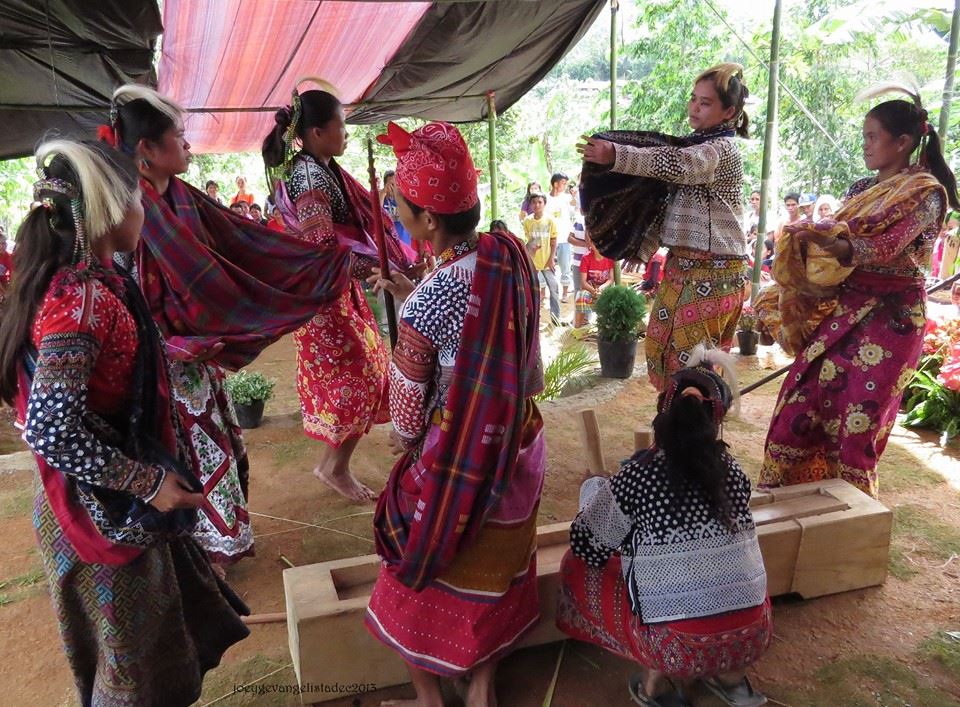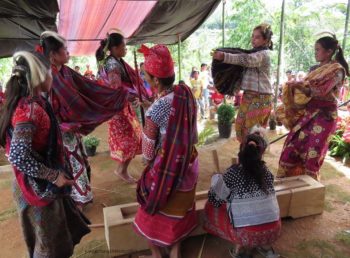 Photo courtesy Tagakolu Aku FB Page
Photo courtesy Tagakolu Aku FB Page
‘Laudato Si’ and the Lumad Worldview

Photo courtesy Tagakolu Aku FB Page
The Pope then highlights the need for an ecological conversion if we are to become protectors of God’s handiwork. Our encounter with Jesus Christ according to him should become evident in our relationship with the world around us. The encyclical also articulates some truths that affirm the way of life of the lumad of Mindanao, which ironically, is gravely in danger mainly because of the same politics and economics that the Pope critiques. These truths are our interconnectedness with others and the world around us, the sacredness of land, the intergenerational solidarity.
In the encyclical, Pope Francis examines ancient stories in the Bible and draws out a lesson that also is at the heart of the lumad worldview: our interconnectedness with everything around us. In paragraph 70 he points out that everything is interconnected, and that genuine care for our own lives and our relationships with nature is inseparable from fraternity, justice and faithfulness to others. For the lumad this is a way of life and not just a mere concept. For example, when the Tagakolu, a lumad tribe in Mindanao, clear a portion of land for farming, they ask permission from God and ask God to bless the land and the people. They also are always mindful of signs from nature whether it is time or not to start clearing the land; this is crucial and is not taken lightly by those taking part in the task. They do not clear the land on their own; it is a collective effort of the members of the family and community, men and women alike. An outsider looking at a number of Tagakolu clearing the land may only see individuals laboring to rid the land of unwanted vegetation. A Tagakolu involved in the collective act has a different experience: it is an act of thanksgiving to God for the land where they could grow food that would nourish the members of the community, it is an act of supplications for God to bless them and their effort, and is a time to connect with the other members of the community by looking after each other while at work and by sharing food and stories during meals. The keen awareness of the lumad of our interconnectedness with everything around us, both seen and unseen, is a way of life from which we can learn much.
In paragraph 146 the Pope clearly articulates that the indigenous peoples do not consider land as a commodity but rather a gift from God and from their ancestors who rest there, a sacred space with which they need to interact if they are to maintain their identity and values. When they remain on their land, they themselves care for it best. A large section of Philippine society that has been assimilated into the Western/American capitalist world-view looks at land as an object to be traded and exploited, contrary to the teaching of the encyclical and to the lumad world-view. The thought of interacting with land would be considered not only nonsensical but downright outrageous; it is after all a thing, an object to be used. To have reverence for land because it is sacred and to be in relationship with it are not new; this is at the heart of how the lumad understands the world, particularly those who have not yet forgotten. This is why mining companies, commercial farmers, politicians and government agencies are unable understand the resistance of the lumad to so-called developmental projects. These projects, no matter how well-intentioned they may seem to be, are founded on an understanding of land that is in diametric contradiction to that of the lumad! It is the people behind these projects who are ignorant and narrow minded and not the lumad. It is indeed inspiring that the Pope bravely takes the side of the lumad when he says that there is a need to respect the rights of peoples and cultures, and to appreciate that the development of a social group presupposes an historical process which takes place within a cultural context and demands the constant and active involvement of local people from within their proper culture (144).
Our interconnectedness with everything discussed in the earlier part of the encyclical does not only include those of our generation but includes our forebears and those who come after us as well. Pope Francis calls this intergenerational solidarity. This is why for the lumad we cannot own the land and everything around us. We cannot own something of which we are a part, albeit a significant one. Our eyes, for example, cannot claim that it is the owner of our whole body. To their understanding the world around us belongs to God who gives this as gift to us as he had done to those who had gone before us and will do so once more to those who come after us. This is precisely why the world needs caring so that those who come after us may again benefit from it as we have in our time. For the lumad this is common knowledge, at least to those who have remained true to their origins. Pope Francis points out that this is an imperative for all: Intergenerational solidarity is not optional, but rather a basic question of justice, since the world we have received also belongs to those who will follow us (159). Intergenerational solidarity for Pope Francis cannot and should not be taken for granted because it is not only our life today that is at stake but the life of those who come after us as well: we may well be leaving to coming generations debris, desolation and filth (161). We are responsible for whatever happens to this world today. Leaving an inhabitable planet to future generations is, first and foremost, up to us. The issue is one which dramatically affects us, for it has to do with the ultimate meaning of our earthly sojourn (160).
Pope Francis exhorts us today to protect this world that God has given to us and to future generations as gift. We are in need of ecological conversion if this is to happen. As Jesus had gone to those who were the least, the last and the lost in his society, we too must reach out to our lumad brothers and sisters, particularly those who have not been and refuse to be assimilated into the current politics and economics of the world. Following the kenotic act of Jesus, it is imperative that we strive to experience and see things from their perspective and not impose ours on them as we most often do wittingly or unwittingly. This is crucial if we are to learn from them how to care for the earth. Let us remember that God has already been in Mindanao even before the settlers from Luzon and Visayas had arrived, before the Spanish and the Americans had occupied it, and even before the coming of Islam. Thus, it is important that we take-off our sandals when we reach out to our lumad brothers and sisters for we shall be treading on holy ground. The future of our planet may well depend on it. (Fr. Joey Ganio Evangelista, MJ | Malita Tagakaulo Mission, Diocese of Digos)


No Comments